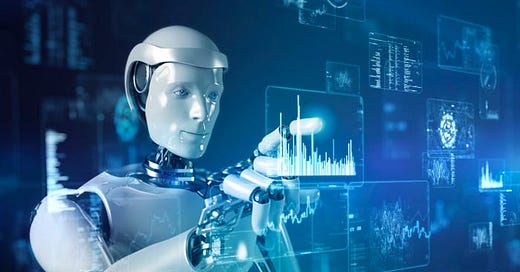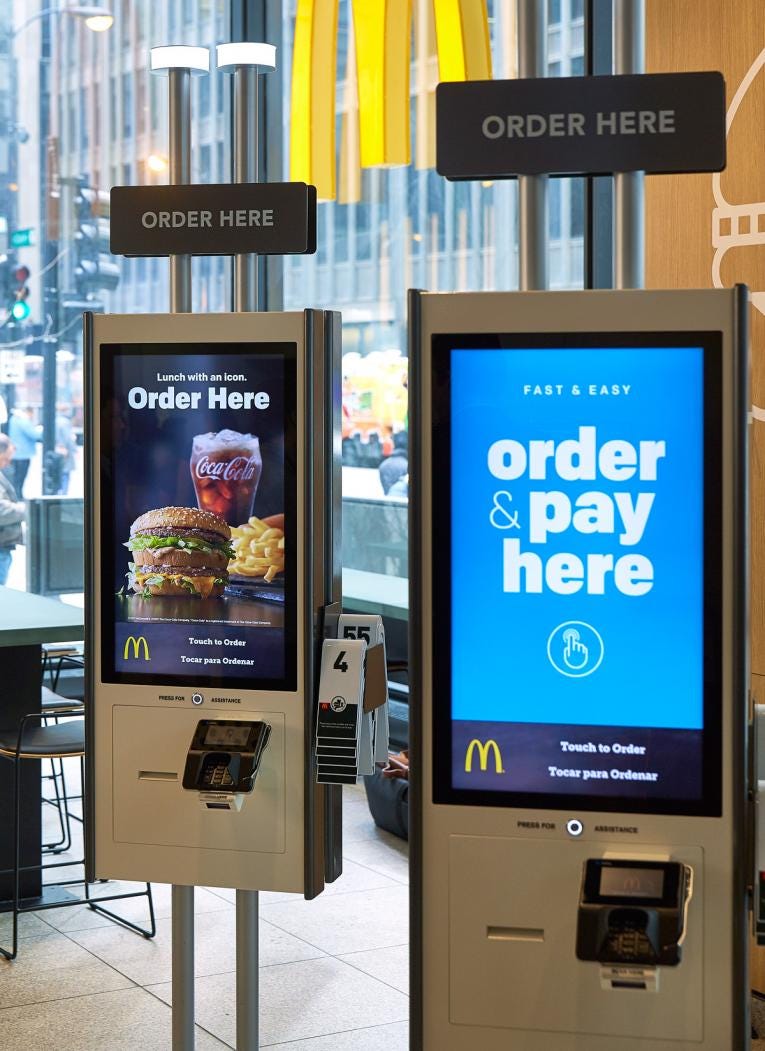“…John Henry told his captain,‘Well, a man ain't nothin' but a man, But before I let your steam drill beat me down, I'll die with a hammer in my hand, Lord, Lord. I'll die with a hammer in my hand.’" The Ballad of John Henry, 19th Century Black folk song
Growing up a lover of American history and music, I used to consider the fictional legend of John Henry, a powerful Black railroad construction worker who died while challenging a steam drill machine that supposedly could do the same work faster and better, a totally fascinating commentary on the Black experience in America.
Thanks to my parents and some outstanding social studies and history teachers back in the day, I understood from an early age that the rise of the United States as an economic superpower was due primarily to enslaved Black labor and the emergence of technology, from the cotton gin, to railroads, to steamboat engines, all of which was used to transport the fruits of enslaved Black labor like cotton, tobacco, sugar cane, and rice, all across the world—to the benefit of patrician whites in the North and South!
Over the past several decades, as automation and artificial intelligence have steadily risen as replacements to American workers, I cannot help but express grave concerns that the Brave New World that acclaimed author Aldous Huxley predicted nearly 100 years ago, has arrived and poses a serious threat to employability and wage earning—threats that could lead to economic panic and violence as prices for housing, goods, and services outweigh the general public's ability to pay.
Now, when it was factory jobs being lost throughout the Midwest during the late 20th Century, there was concern about the loss of high wage blue collar jobs for the comparatively few, but there was little mass outcry from a general public that was happy to buy their robot made cars quicker and cheaper.
But as one whose very first job with a W-2 was as a McDonald's crew member from 10th grade until I enrolled at Morehouse College as a freshman in 1990, I admit that I was somewhat melancholy the first time that I stopped along I-10 for an Egg McMuffin a few years ago and wasn't greeted with “hi, welcome to McDonald's,” but was directed to an automated kiosk to place and pay for my order with no human assistance!
Instead of three cash registers and three workers, more and more McDonalds restaurants now employ three automated kiosks that do the same work for free…
Now, not only are these kiosks springing up at other fast food joints, but even my local credit union has gone automated by replacing the four to six paid human tellers who used to assist the public each day, with large machines that do the same work—albeit slower—like the steam drill in the Ballad of John Henry.
Earlier today, I happened upon a Washington Post article that reports that OpenAI, the maker of ChatGPT, will pay the Associated Press to access its news stories as far back as 1985 to train its artificial intelligence algorithms to do the work that formerly was done by reporters and editors in real newsrooms.
For many years now, the newspaper and magazine industries have been hit hard by budget cuts that were due, in part, to the paucity of advertising dollars that traditionally fueled print journalism.
On the one hand, traditional media cut backs and layoffs have allowed many talented writers to create their own blogs and aggregate sites—all the while petitioning readers to subscribe or donate to keep their forms of journalism independent and free from corporate control. In fact, I founded the Hobbservation Point due to my articles that were once published constantly and quickly by The Hill, soon dried up like a raisin in the sun—as did the paychecks that came from corporate offices—when the Trump administration began and my progressive political analysis was no longer in demand. To that end, for those who have not done so already, please consider subscribing or donating to my blog today by clicking on the following link:
On the other hand, the emergence of artificial intelligence (AI) apparati as cyber content creators threatens to render some of the remaining vestiges of human news reporting obsolete in the years to come. In fact, what really struck me as perverse about our new AI world was the following paragraphs from today's WP article:
OpenAI, Google and other AI companies have used billions of sentences pulled off the open internet to build the “large language models” that power their chatbots. News stories, Wikipedia articles, social media comments and blog posts have all gone into the models without permission from their owners, with the tech companies generally arguing they’re free to use the public data.”
Curiously enough, I've already experienced a tad bit of this via Muckrack.com, a website that began archiving my blogs and articles several years ago—without my express permission. Once I peeped game, to its credit, Muckrack has since afforded me opportunities to receive inquiries that ultimately put money in my pocket, but I must admit that it was not lost on me that initially, my articles were being “DeeBoed”— or, taken by force for my readers who have never watched the cult classic movie “Friday” or its iconic bully “DeeBo,” played by the late Tiny Lister (below). 😂
Now, there's a part of me, perhaps the idealistic part, that believes that many readers across the world will continue to get their news and analysis from sentient beings, folks who, like Ol’ Hobbs, pay homage to the French philosopher Rene Descartes by living his creed “Cogito Ergo Sum”— “I think, therefore, I am.”
But my pragmatic part fears that there are far too many of our fellow citizens of the world who don't like to read—let alone think deeply about what they've read—and who just may enjoy the mass produced “McNews” segments that some computer which cannot adequately weigh or convey the social impact of current events spits out on demand.
In conclusion, with automation having already eliminated many factory and service industry jobs, and artificial intelligence threatening both mainstream and niche media, I cannot help but wonder how long will it be before legal controversies and cases are being analyzed and argued via artificially intelligent advocates? How long will it be before teachers and professors are replaced by a computerized voice teaching children and adults? Will local doctors, nurses, dentists, and pharmacists be replaced by artificially intelligent robots who diagnose and treat our ailments? I don't know, but what I do know is that if machines can put more money in the pockets of tech giants and the extremely wealthy investors in the industrialized Western nations, we won't have to wait too long to find out…








"Worlds are colliding" (circa, G. Constanza).
In a surreal moment, I just enthusiastically read the blog post of my good friend, Chuck Hobbs... with great interest. It was a history-aligned essay about mass unemployment due to technology.
You see, when we started the 8th grade together at FAMU DRS (K-12), it was the first time that Chuck and I had different class schedules. Those on the pre-college engineering track went to Algebra I; those who would pursue non-STEM careers went to 8th grade math. But this was an inevitable conclusion to our journey. You see, for years, I was one of the few who dominated class participation in our math classes, while Chuck was the sole dominator (think Lebron James playing 8th grade bball against his mortal classmates) of social studies and history-- classes I could not stand.
Well now, as an engineer who creates Industry 4.0 technology that leverages AI, the race to be first creator of new ideas has forced me to understand society in the prior industrial revolutions. I am now trying to retro-learn economics and the history of tech's impact on society after detesting social studies and history in K-12. I am slowly reading Chuck's words in hopes of gaining a layman's lesson of the topics I now need to digest, and used to detest. Thanks for the history lesson, Professor Hobbs!
Thankful to be a Hobbservation Point subscriber! Awesome to know that we both had the McDonalds “experience” as teenagers. It’s very disheartening to see where we are today. This is news that I can use from someone I trust! Thanks for your hard work and dedication Chuck! 💪🏽